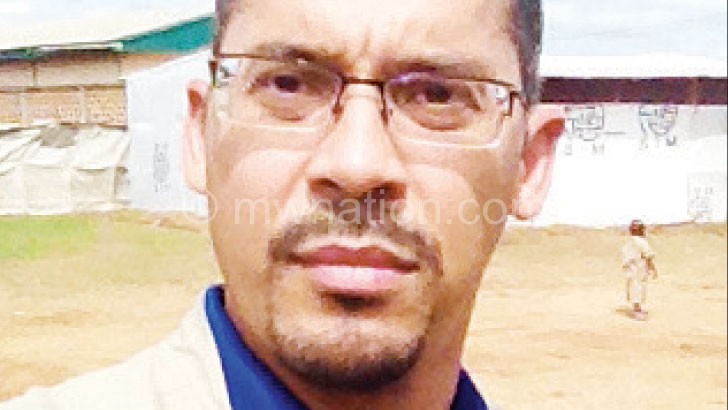‘Women key to food security’
The United Nations World Food Programme (WFP) adviser on gender Patrick Teixeira visited Malawi recently to conduct a workshop on gender mainstreaming in the food security sector. As Malawi joined the world in commemorating International Women’s Day yesterday amid reports of hunger in the country, we caught up with Teixeira on mainstreaming gender issues in food security interventions.

Q
:How are gender issues related to food security?
A
:Gender issues and food security are closely interlinked. There is compelling evidence that gender inequality is one of the main causes as well as an effect of food insecurity. Gender inequality exacerbates food and nutrition insecurity and keeps vulnerable people in a vicious poverty cycle.
Women play a central role in both the household and community food security ranging from production, gathering, preparing, to feeding-and this is seen across countries and cultures. Yet, there are persistent disparities and inequalities between men and women in terms of access, control, ownership over productive resources such as land, proceeds from land, capital, technology, education and reliable markets, just to mention a few.
Q
:To what extent does lack of gender equality affect underlying causes of food insecurity?
A
:The lack of gender equality and women’s empowerment in the contexts where WFP works exacerbates the underlying causes and effects of food insecurity and malnutrition. Gender inequality manifests in different forms such as denying women and girls’ access and control over resources that have a direct bearing on food security. Due to men’s greater influence in decision making processes, women and girls have a more limited say on agricultural decisions at both household and community level. In the end, this undermines women’s capacity to produce adequate food both for sale and consumption, despite the fact that women often do most of the work. Further, women and girls are the most disadvantaged on access to education, training and technology and this also limits their ability to become food secure.
Unicef’s 2007 report on the State of the World’s Children indicated that when resources are scarce, women generally prioritise food and nutrition of household members above other personal and household issues; hence, an increase in access to and control over income among women directly translates into increase in household spending on food. So, ensuring gender equality and women’s empowerment through equal participation, inclusion of women in decision making and equal access to opportunities directly translate into positive food security and nutritional outcomes for both men and women.
In Malawi, a partnership between WFP and Institute of Development Studies [IDS], which is based at the UK’s Sussex University, is playing a key role in building a strong evidence base that demonstrates how gender equality programming is key to achieving food
and nutrition security, as well as resilience for the most vulnerable in Malawi.
Q
:Could you explain more about this partnership?
A
:The partnership, called ‘Innovations from the Field: Gender mainstreaming from the Ground Up’ is a global partnership programme of WFP and IDS centred on gender equality and women’s empowerment in food security and nutrition.
Gender equality and women’s empowerment are paramount to WFP’s commitment to reach zero hunger. The gender mainstreaming programme uses a Participatory Learning Approach [PAL] which helps WFP, government and partner staff to research, reflect and learn about what already works to mainstream gender equality in these WFP field programmes, why it works and where improvements are needed to further support women’s empowerment and gender equality.
Q
:Where else, apart from Malawi, is the programme being carried out?
A
: Apart from Malawi, the pilot phase which ran from 2013 to 2014 was implemented in Senegal, Lesotho, Guatemala, and Kenya. The second and current phase is targeting seven countries including Malawi.
Q
: What are some of the key lessons from this programme?
A
: Firstly, the need to recognise gender as central to protection. This has helped WFP to further strengthen its monitoring tools to ensure that they adequately capture gender and protection issues.
Secondly, the need to ensure that development programmes do not exacerbate unpaid care work by relying heavily on women as community volunteers to cook, fetch water and firewood. This finding has helped to improve the design of school feeding in Malawi to better recognise and reduce unpaid care work, as well as redistribute the work between women and men, wherever possible.
And finally, the third lesson is the need to engage with men and boys for effective gender and food and nutrition security programming. WFP Malawi is exploring ways to reinforce positive images of men participating in programmes to improve their children’s nutrition, such as through a comprehensive social behaviour change communication [SBCC] strategy for the prevention of stunting, targeting male community leaders and local authorities for sensitisation, and forming alliances with networks of men advocating for equal rights.
Q
: Are there any targets this programme would like to achieve both long and short term?
A
: In Malawi, the programme will focus on three areas: making school feeding programmes more gender sensitive by figuring out effective strategies for recognizing, reducing and redistributing unpaid care and burdens largely shouldered by female cooks; strengthening effectiveness of gender sensitive accountability and feedback mechanisms in the emergency response; and understanding how resilience building interventions may contribute to increased gender equality, empowerment and how this also influences access to assets, decision making and leadership roles within the community.
In the long-term, we would like this programme to catalyse and help optimise effective and efficient mainstreaming of gender across all WFP interventions, knowing that gender equality is mission critical to creating a world with zero hunger. It is also our hope that this initiative will facilitate wide dissemination, uptake and application of lessons not only within WFP, but with the government and partners as well. n





